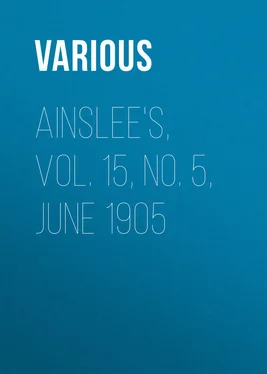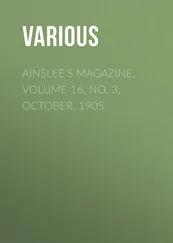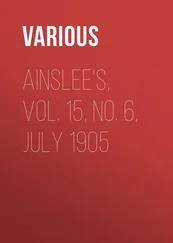Various - Ainslee's, Vol. 15, No. 5, June 1905
Здесь есть возможность читать онлайн «Various - Ainslee's, Vol. 15, No. 5, June 1905» — ознакомительный отрывок электронной книги совершенно бесплатно, а после прочтения отрывка купить полную версию. В некоторых случаях можно слушать аудио, скачать через торрент в формате fb2 и присутствует краткое содержание. Издательство: Иностранный паблик, Жанр: periodic, literature_20, Поэзия, foreign_poetry, на английском языке. Описание произведения, (предисловие) а так же отзывы посетителей доступны на портале библиотеки ЛибКат.
- Название:Ainslee's, Vol. 15, No. 5, June 1905
- Автор:
- Издательство:Иностранный паблик
- Жанр:
- Год:неизвестен
- ISBN:нет данных
- Рейтинг книги:5 / 5. Голосов: 1
-
Избранное:Добавить в избранное
- Отзывы:
-
Ваша оценка:
- 100
- 1
- 2
- 3
- 4
- 5
Ainslee's, Vol. 15, No. 5, June 1905: краткое содержание, описание и аннотация
Предлагаем к чтению аннотацию, описание, краткое содержание или предисловие (зависит от того, что написал сам автор книги «Ainslee's, Vol. 15, No. 5, June 1905»). Если вы не нашли необходимую информацию о книге — напишите в комментариях, мы постараемся отыскать её.
Ainslee's, Vol. 15, No. 5, June 1905 — читать онлайн ознакомительный отрывок
Ниже представлен текст книги, разбитый по страницам. Система сохранения места последней прочитанной страницы, позволяет с удобством читать онлайн бесплатно книгу «Ainslee's, Vol. 15, No. 5, June 1905», без необходимости каждый раз заново искать на чём Вы остановились. Поставьте закладку, и сможете в любой момент перейти на страницу, на которой закончили чтение.
Интервал:
Закладка:
Various
Ainslee's, Vol. 15, No. 5, June 1905
THE OUTGOING OF SIMEON
Simeon Ponsonby – the professor of botany at Harmouth – had married when over forty the eldest daughter of a distinguished though impecunious family in his own college town. His mother, on her deathbed, foresaw that he would need a housekeeper and suggested the match.
“Simeon,” she said, “it isn’t for us to question the Lord’s ways, but I am mortally sorry to leave you, my son; it is hard for a man to shift for himself. I was thinking now if you were to marry Deena Shelton you might go right along in the old house. The Sheltons would be glad to have her off their hands, and she is used to plain living. She would know enough to keep her soup pot always simmering on the back of the range and make her preserves with half the regular quantity of sugar. I like her because she brushes her hair and parts it in the middle, and she has worn the same best dress for three years.”
Soon after Mrs. Ponsonby died and Simeon married Deena.
She didn’t particularly want to marry him, but then, on the other hand, she was not violently set against it. She saw romance through her mother’s eyes, and Mrs. Shelton said Professor Ponsonby was a man any girl might be proud to win. If his sympathies were as narrow as his shoulders, his scientific reputation extended over the civilized world, and Harmouth was proud of the fact. Deena’s attention was not called to his sympathies, and it was called to his reputation.
He proposed to Miss Shelton in a few well-chosen words, placed his mother’s old-fashioned diamond ring on her finger, and urged forward the preparations for the wedding with an impatience that bespoke an ardent disposition. Later Deena learned that his one servant had grown reckless in joints after Mrs. Ponsonby’s death, and the house bills had shocked Simeon into seeking immediate aid.
At twenty Deena was able to accommodate herself to her new life with something more than resignation; a wider experience would have made it intolerable. She was flattered by his selection, proud to have a house of her own, and not sorry to be freed from the burdens of her own home. There were no little Ponsonbys, and there had been five younger Sheltons, all clamoring for Deena’s love and care, whereas Simeon made no claims except that she should stay at home and care for the house and not exceed her allowance. If she expected to see a great deal of her own family she was mistaken, for, while no words passed on the subject, she felt that visiting was to be discouraged and the power to invite was vested in Simeon alone. Respect was the keynote of her attitude in regard to him, and he made little effort to bridge the chasm of years between them.
He was a tall, spare man, slightly stooped, with a prominent forehead, insignificant nose, and eyes red and strained through too ardent a use of the microscope. He habitually wore gold-rimmed spectacles; indeed, he put them on in the morning before he tied his cravat, and took them off at the corresponding moment of undressing at night. His mouth was his best feature, for, while the lips were pinched, they had a kind of cold refinement.
He was a just man but close, and the stipend he gave his wife for their monthly expenses barely kept them in comfort, but Deena had been brought up in the school of adversity, and had few personal needs. Her house absorbed all her interest, as well as stray pennies. The old mahogany furniture was polished till it shone; the Ponsonby silver tea set looked as bright as if no battering years lay between it and its maker’s hand a century ago; the curtains were always clean; the flowers seemed to grow by magic – and Deena still parted her wonderful bronze hair and kept it sleek.
At the end of two years, when she was twenty-two, a ripple of excitement came into her life; another Shelton girl married, and caused even greater relief to her family than had Deena, for she married a Boston man with money. He had been a student at Harmouth and had fallen in love with Polly Shelton’s violet eyes and strange red-gold hair, that seemed the only gold fate had bestowed upon the Sheltons. He took Polly to Boston, where, as young Mrs. Benjamin Minthrop, she became the belle of the season, and almost a professional beauty, though she couldn’t hold a candle to Deena – Deena whose adornment was “a meek and quiet spirit,” who obeyed Simeon with the subjection St. Peter recommended – whose conversation was “chaste coupled with fear.”
But one day all this admirable monotony came to an end quite adventitiously, and events came treading on each other’s heels. It was a crisp October day, and an automobile ran tooting and snorting, and trailing its vile smells, through Harmouth till it stopped at Professor Ponsonby’s gate and a lady got out and ran up the courtyard path. Deena had been trying in vain to make quince jelly stiffen — jell was the word used in the receipt book of the late Mrs. Ponsonby – with the modicum of sugar prescribed, till in despair she had resorted to a pinch of gelatine, and felt that the shade of her mother-in-law was ticking the word incompetent from the clock in the hall – when suddenly the watchword was drowned in the stertorous breathing of the machine at the gate, and Polly whisked in without ringing and met Deena face to face.
“We have come to take you for a spin in our new automobile,” Polly cried, gayly. “Where is Simeon? You think he would not care to go? Well, leave him for once, and come as far as Wolfshead, and we will lunch there and bring you back before sunset.”
Deena’s delicate complexion was reddened by the heat of the preserve kettle, her sleeves were rolled above her elbows, and a checked apron with a bib acted as overalls. Polly twitched her to the stairs.
“What a fright you make of yourself,” she exclaimed; “and yet, I declare, you are pretty, in spite of it! Ben has to go down in the town to get some more gasoline, and then he means to persuade Stephen French to go with us, so rush upstairs and change your dress while I report to him that you will go, and he will come back for us in half an hour.”
Stephen French, who was to make the fourth in the automobile, was Harmouth’s young professor of zoölogy, a favorite alike with the students and the dons, with the social element in the town as well as the academic. To Ben Minthrop he had been a saving grace during a rather dissipated career at college, and now that that young gentleman was married, and his feet set in the path of commercial respectability, the friendship was even more cemented. On Ben’s part there was admiration and gratitude, on Stephen’s the genuine liking an older man has for a youngster who has had the pluck to pull himself together. It was a bond between the Shelton sisters that their husbands shared one sentiment in common – namely, a romantic affection for Stephen French.
Deena was standing in her petticoat when her sister joined her in her bed-room – not in a petticoat of lace and needlework, such as peeped from under the edge of Polly’s smart frock as she threw herself into a chair, but a skimpy black silk skirt with a prim ruffle, made from an old gown of Mrs. Ponsonby’s. It was neat and fresh, however, and her neck and arms, exposed by her little tucked underwaist, were of a beauty to ravish a painter or a sculptor. Polly herself, boyish and angular in build, groaned to think of such perfection “born to blush unseen”; her one season in Boston had demonstrated to her the value of beauty as an asset in that strange, modern exchange we call society. She was evidently trying to say something that would not get itself said, and her elder sister was too busy with her toilet to notice the signs of perturbation. Finally the words came with a rush.
Читать дальшеИнтервал:
Закладка:
Похожие книги на «Ainslee's, Vol. 15, No. 5, June 1905»
Представляем Вашему вниманию похожие книги на «Ainslee's, Vol. 15, No. 5, June 1905» списком для выбора. Мы отобрали схожую по названию и смыслу литературу в надежде предоставить читателям больше вариантов отыскать новые, интересные, ещё непрочитанные произведения.
Обсуждение, отзывы о книге «Ainslee's, Vol. 15, No. 5, June 1905» и просто собственные мнения читателей. Оставьте ваши комментарии, напишите, что Вы думаете о произведении, его смысле или главных героях. Укажите что конкретно понравилось, а что нет, и почему Вы так считаете.






![Various - Birds and Nature, Vol. 10 No. 1 [June 1901]](/books/745231/various-birds-and-nature-vol-10-no-1-june-1901-thumb.webp)


![Various - Birds and Nature, Vol. 12 No. 1 [June 1902]](/books/745522/various-birds-and-nature-vol-12-no-1-june-1902-thumb.webp)


